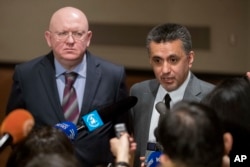Defense Secretary Jim Mattis promised Thursday the Pentagon will "notify" Congress before any possible military action in Syria, where the U.S. is considering responding to a suspected chemical weapons attack.
"There will be notification to leadership, of course, prior to the attack," Mattis said in his testimony at the House Armed Services Committee. "We will report to Congress. We will keep open lines of communication."
But notably, Mattis did not indicate the Trump administration would seek congressional approval before the strike, which presumably would target the government of Syrian President Bashar al-Assad.
Trump says the U.S. will soon launch "nice and new and smart" missiles in response to last week's suspected poison gas attack, which left scores dead in a rebel-held area. Trump blames Assad for the attack.
A U.S. attack is likely to upset a small but growing number of U.S. lawmakers who demand President Donald Trump first ask Congress to authorize any hostilities, citing the War Powers Resolution of 1973, a federal law intended to check the president's ability to wage war.
Executive power
U.S. presidents, both Republican and Democrat, have long argued they have legal authority to order airstrikes and other short-term military campaigns if those engagements fall short of the "hostilities" mentioned in the War Powers Resolution.
Additionally, U.S. presidents have cited a pair of authorizations by Congress following the Sept. 11, 2001 terror attacks as justification for the near-constant U.S. strikes on Islamic militants around the world.
The Trump administration has used those authorizations as justification for its current war in Syria. The U.S. has 2,000 troops in Syria, and helps lead an international coalition against Islamic State in Syria and neighboring Iraq.
The overwhelming majority of U.S. lawmakers have not publicly objected to the administration's legal rationale for those missions. But as Trump considers expanding the U.S. war to include attacks on Syrian government targets, some in Congress are speaking up.
'War by tweet'
"President Trump has no legal authority for broadening the war in Syria," Senator Bernie Sanders said in a statement. "It is Congress, not the president, who determines whether our country goes to war, and Congress must not abdicate that responsibility.
"Trump is a president, not a king — he needs to come to Congress if he wants to initiate military action," said Democratic Senator Tim Kaine. "If he strikes Syria without our approval, what's to stop him from bombing North Korea or Iran?"
Several members of Trump's Republican Party also have criticized a possible attack.
"Promising war by tweet, insults not only the Constitution but every soldier who puts their life on the line," said Republican Senator Rand Paul, a prominent anti-war voice, in a Wednesday tweet.
"The use of chemical weapons absolutely requires a response from the United States," said Republican Senator Mike Lee. "But if that response is going to include military force, the President of the United States should come to Congress and ask for authorization before military force is used."
The issue came up briefly last year when the Trump administration launched Tomahawk cruise missiles at a Syrian air base. But Trump officials said that attack was an isolated incident, and did not need congressional approval.
"Obviously, the administration will follow whatever laws and regulations are necessary for any actions that we take," White House Press Secretary Sarah Sanders said Wednesday. "Because we haven't laid out any specific actions that we plan to take, I can't tell you exactly what needs we would have to go to Congress with."
Trump's past comments
Trump himself has in the past argued that U.S. presidents need to seek Congress' permission before military action, tweeting this in 2013, as former President Barack Obama considered attacks against the Assad government:
"What will we get for bombing Syria besides more debt and a possible long term conflict? Obama needs Congressional approval." Trump said in another tweet at the time.
Obama eventually decided against the attacks, instead striking a deal to remove some of the Syrian government's chemical weapons. That deal failed to stop poison gas attacks in Syria, as evidenced by the repeated use of chlorine and other chemical agents.
U.N. deadlock
An attack on the Syrian government, supporters of the U.S.-led airstrikes say, would serve as a message to Assad that he cannot continue to violate international law by using chemical weapons on his people.
But Russia's U.N. ambassador, Vassily Nebenzia, says a U.S. attack on Assad would itself violate international law unless the U.S. coalition first gets approval from the United Nations.
"Of course it is. Even the threat of a use of force is a violation of the U.N. Charter, let alone a strike itself," Nebenzia told reporters Thursday.
The U.N. charter, which the U.S. has ratified, states that countries can only use force on another nation's soil in self-defense or if the U.N. Security Council has authorized action through a resolution.
One state can also request the military assistance of another, as Assad's government did with Moscow, which sent troops to Syria in 2015. That support means Russia would almost certainly veto any Security Council resolution authorizing force against Assad.
That may not stop Trump, however. The president is a frequent critic of the U.N. His recently appointed national security adviser, John Bolton, has argued that the U.S. should not be prevented from unilateral military action.
VOA's Margaret Besheer contributed to this story







